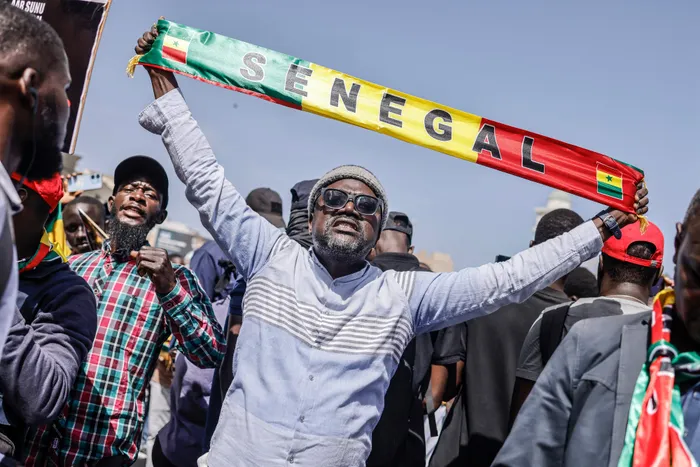Sall commits to abide by Constitutional Council ruling

Picture: John Wessels / AFP – Civil society and political groups march calling on the authorities to set the election date, in Dakar, on February 17, 2024. On February 16, Senegal’s Constitutional Council overturned President Macky Sall's postponement of this month’s presidential election, a historic decision that opens up a realm of uncertainty for the traditionally stable West African nation.
By AFP and Reuters Staff
Thousands of Senegalese joined the first authorised protest in the country’s capital yesterday since President Macky Sall postponed elections for his successor before a top court overturned his ruling.
Sall’s last-minute move to delay the February 25 poll triggered traditionally stable Senegal’s worst crisis in decades.
Senegal’s Constitutional Council intervened on Thursday and the president, under growing pressure at home and abroad, vowed to organise the elections “as soon as possible”, without any date being set.
On the streets of Dakar, demonstrators donned black T-shirts emblazoned with “Protect our Election”, the name of the civil society collective that organised the peaceful protest. They held up placards reading “Free Senegal”, “Respect the election date” and “No to a constitutional coup d’Etat”.
Gendarmes were out in force around the march, but they did not wear riot gear as they had during previous demonstrations.
Tensions have eased since the council demanded the vote take place “as soon as possible” and the authorities gave the go-ahead for the march. “Today’s watchword is mobilisation,” said presidential candidate Malick Gakou on the march.
“The State of Senegal has no room for error any longer and must organise the election in March so that the handover of power between President Sall and the new president can take place on April 2,” the end of the official mandate for Sall, who has been in power since 2012 and decided not to run again.
His decision to follow the council’s call “lifts a lot of stress”, said rapper El Maestro le Kangham, draped in a Senegal flag. “Personally, I don’t trust him and I’m waiting to see if he keeps his word,” the 34-year-old demonstrator said.
Previous attempts to stage protests against the postponement of the ballot, which parliament had decided to stage on December 15, were all banned and ended in violence with large numbers of arrests. Three people were killed on February 9.
Sall said he had called off the vote over disputes about the disqualification of potential candidates and concern about a return to unrest seen in 2021 and 2023.
On Friday, Sall said he would fully abide by the Constitutional Court decision that overturned the postponement of the presidential election to December, pledging to hold consultations to organise the vote as soon as possible.
A bill that pushed back the February 25 poll plunged the country into electoral uncertainty.
Sall “has taken note” of the council’s decision and request for the election to be held as soon as possible, the presidency said in a statement. “The president intends to fully execute the constitutional council’s decision,” it added.
Sall has been under significant pressure to accept the ruling. The week-long electoral crisis has already led to violent protests and warnings of authoritarian overreach in one of coup-hit West Africa’s more stable democracies.
Another protest against the delay was due to begin in Dakar just as the presidency issued Sall’s response. Fewer than 100 people turned up as police blocked access to meeting points and fired tear gas to disperse protesters.
Dakar resident Mohamed Alpha Diop welcomed the prospect of a shorter delay to elections. “I think it will really calm things down,” he said.
Opposition leaders, West Africa’s main economic and political bloc Ecowas, and foreign powers including the US and France urged authorities earlier on Friday to comply with the judgment and quickly set a new date for the election.
Many opposition figures have welcomed the council’s ruling and some have called on Sall to set an election date before April 2, when his mandate expires.
“On April 2, the president will go,” said opposition leader Khalifa Sall, who has condemned recent events as an “institutional coup”.
“Now conditions need to be adapted, because holding elections on February 25 would not be materially possible,” he said during an interview in Dakar, adding that he was prepared to take part in talks with all sides to agree on a new date.
“We could not manage to hold the election before April 2,” he noted, stressing that all relevant actors would need to be consulted on the matter.
Senegal had never delayed a presidential vote.
Its four largely peaceful transitions of power via the ballot box since independence from France in 1960 built up its reputation as one of West Africa’s strongest democracies.
The abrupt postponement dismayed those who believed Senegal would stick to a standard electoral course that has become increasingly uncommon in West Africa, where military takeovers and constitutional manoeuvring have forced democracy into retreat in many countries in recent years. – AFP and Reuters
Related Topics: